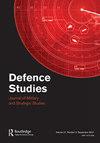DYNAMIC CAPABILITIES: proposition of an analysis tool for a defense industry in Brazil
Q1 Arts and Humanities
引用次数: 0
Abstract
ABSTRACT Purpose – This study starts from the observation that there is a mismatch, in Brazil, between the strategic actions listed in the National Defense Strategy, and the capabilities of Strategic Defense Companies. Design/methodology/approach – The study is classified from the point of view of the approach to the problem, as qualitative , using the single case study method. Findings – The use of the DC-Defense instrument will enable Strategic Defense Companies to know their dynamic capabilities, so that they can, in their strategic planning, develop actions that allow them to generate competitive advantage. Research limitations/implications – As a research limitation, it is pointed out the study of a single case, IMBEL, but the data of Strategic Defense Companies are not available, due to the complexity and sensitivity of the products and technologies involved, which demands secrecy on the part of the high management. Practical implications – The DC-Defense instrument aims to help Strategic Defense Companies to know their dynamic capabilities and set goals in their strategic plans, which allow them to generate competitive advantage. Originality/value – In this study, an instrument called Dynamic Capacities in Defense (DC-Defense) was proposed..动态能力:巴西国防工业分析工具的命题
摘要目的——本研究的出发点是,在巴西,《国防战略》中列出的战略行动与战略防御公司的能力不匹配。设计/方法论/方法——从问题方法的角度来看,该研究被归类为定性研究,使用单一案例研究方法。调查结果-DC防御工具的使用将使战略防御公司能够了解其动态能力,以便在战略规划中制定行动,从而产生竞争优势。研究局限性/影响——作为研究局限性,有人指出,对IMBEL这一单一案例的研究,但由于所涉及的产品和技术的复杂性和敏感性,战略防御公司的数据不可用,这要求高级管理层保密。实际意义——DC国防工具旨在帮助战略国防公司了解其动态能力,并在战略计划中设定目标,从而产生竞争优势。独创性/价值——在这项研究中,提出了一种名为动态防御能力(DC Defense)的工具。。
本文章由计算机程序翻译,如有差异,请以英文原文为准。
求助全文
约1分钟内获得全文
求助全文

 求助内容:
求助内容: 应助结果提醒方式:
应助结果提醒方式:


